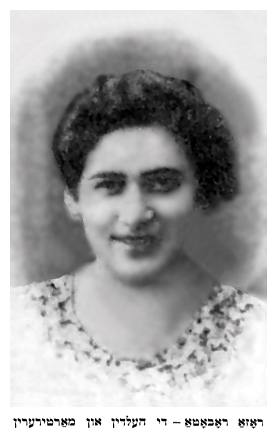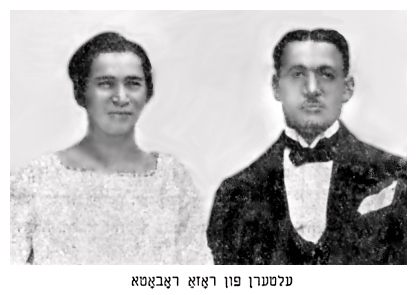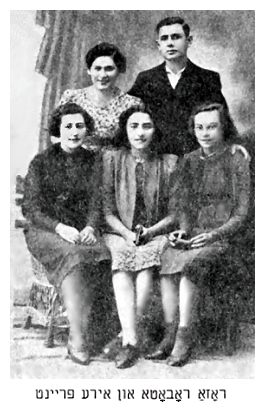
|
[Page 397]

|
|
|
[Page 398]
blank
[Page 399]
top square:
| ||||
Bottom square: A similar Yizkor for Rosa Robota by the survivors of Ciechanow.
[Page 400]
Her Life, Struggle Against the Germans and Her Death as a Martyr
In the history of the daring uprising struggle that the tortured Auschwitz prisoners conducted against the German mass-murderers -- Rosa Robota wrote a chapter of heroism, courage and perseverance and elevation of morale and martyrdom. In the Jewish literature of martyrdom the term martyr is used very sparingly, but Rosa Robota earned this by her acts in Auschwitz and can rightfully be called a martyr.
*
Beloved by her school friends because of her goodness, devotion and true friendship that she showed her friends, she already in the sixth grade organized a school-group that, after finishing school, joined Hashomeir Hatzair. The group -- Hene Greenbaum, Sonya Gurna, Chaya Mundzak, Lola Kirsh, Rukhche Kirshenzweig, Melekh Zilberstein, Moishe Shlesinger, Noah Isenberg, Shepsl Galk and Shmuel Viezba -- formed a special kvutza in Hashomeir Hatzair.

|
|
|
[Page 401]

|
Rosa - second from right, standing |
|
|
During the German extermination the kvutza did much to ease the need of the tortured Jews.
Rosa had her second home in the Hashomeir Hatzair organization. Many of her friends went to the kibbutzim to prepare themselves to fulfil the dream to make aliyah to Eretz Yisroel. Rosa strove for this also, but because of difficulties at home she had to temporarily go to a Hechalutz hachshara. Meanwhile, the German extermination came and this destroyed all her efforts.
When the Germans destroyed Ciechanow, Rosa was a young girl. She and her sister were seized for work where the governor had lived before the war. The two young girls were tortured at work. Soon Rosa and her family lost their home. The Germans destroyed the house where they lived, together with the whole Jewish quarter.
[Page 402]
The tragic ghetto life started. Rosa and her family moved in with relatives.
In the ghetto Rosa participated in various consultations of the young Jewish people regarding the preparation of an uprising, but conditions in the Ciechanow ghetto were not ripe for this. Rosa was always going around enraged because she couldn't avenge the suffering of the Jews.
In November 1942 Rosa, together with the Ciechanow Jews, was sent to Auschwitz, the extermination-hell. During the “selections” -- when some were chosen to go to the gas chambers, while others were found fit for work -- Rosa was amongst those for work. She was sent to work not far from the ammunition factory “Union” in Auschwitz. There a large number of women were working, amongst them young girls from Ciechanow. Some of them, with Rosa Robota at the head, volunteered with heart and soul for the underground movement, against the Germans, that the tortured prisoners organized.
As has already been mentioned in the memoirs that are in this Yizkor Book, the Ciechanow Jews in Auschwitz stuck together as much as possible in the notorious German torture-lager. They found out about the existence of the underground movement and made contact with it.
The organizers of the uprising, who knew that there are Ciechanow girls employed in the production of ammunition, hinted to the Ciechanowers to establish contact with the women they knew in order to get explosives. Here Rosa came on the scene, with her wonderful personality. She took upon herself the dangerous, life-threatening role of getting explosives for the underground in Auschwitz.
Noah Zabludowicz of the Ciechanow group established contact with Rosa, and as Moishe Kulka has written, Rosa promised her help. It didn't take long and the contact was made. During a break at work, the women placed a bundle containing dynamite at a pre-arranged spot. All this was done during the night shift, when the control was not so strict.
[Page 403]
In the morning, when the workers returned from work, I waited for them and took a half loaf of bread from a Hungarian Jew whom I knew. Inside the bread I found the packet. I hid it at my place of work and later gave it to a German Jew who worked in the railway station.
The dynamite, that was handed over to the Sonderkommando through Rosa Robota, was then given to a Russian technician, Borodin, and he constructed bombs in cans of preserves. The bombs were hidden in various places.
Much has been written about Rosa Robota's devotion and struggle against the Germans, and her heroic death. To all this we want to add an excerpt from a publication that Raya Kagan wrote in Yediot Yad Vashem, Number 15/16 (entitled “Four Who Were Executed”). Raya Kagan, the prisoner in Auschwitz, and one who also took part in the uprising, wrote:
“As is well known, a small group of young Jewish girls helped, with heroic deeds, particularly in the Auschwitz conditions, to explode one of the crematoriums in Auschwitz. The group consisted of four girls: two of them, Tosca Esther, and Regina, worked in the manufacturing of ammunition at “Union” in the section called gunpowder kommando. A third girl, Ella Gertner, worked in the office of this section. Rosa was not connected with “Union.” She was active in the underground movement in Birkenau and she was given the risky job of establishing contact between the underground movement and the girls who work in the explosives section.
Rosa got the gunpowder from Ella Gertner after she stole it from the factory “Union” and she turned it over to trusty hands of the men's lager in Birkenau.
The publication of Raya Kagan's article was written mainly to explain how the Germans discovered the participation of the girls in the underground movement in Auschwitz. Regarding the arrest and the torture that Rosa Robota endured, R. Kagan wrote:
[Page 404]
“Rosa Robota was arrested. Apparently the S.S. considered her one of the initiators of the whole action, and she (Rosa) drank from the cup of agony. She was forced, by the Germans, to reveal who were the closest links to the uprising. She gave the name of a Sonderkommando to whom she had given the package of explosives, but that one was no longer alive.” All the interrogations were made in the barrack where I worked. I saw the girls. I heard the cries of the tortured ones that filled the whole barrack. In my eyes, just as in the eyes of Yisroel Gutman,*
*Yisroel Gutman, author of the book, Anashim v'aifer (People and Ashes) in which the experiences of Auschwitz are described, as well as the armed uprising, with the heroic participation of Rosa Robota
.
Rosa Robota stands in all the grace of her heroic acts.
In the brochure, Kehillat Ciechanow Bkhurban Vmavet shel Rosa Robota (Kehillah Ciechanow And The Death of Rosa Robota) there is the following description about the heroic deeds of Rosa Robota and the girls who supplied explosives to the underground fighters in Auschwitz:
Noah Zabludowicz made contact with the women who worked in the ammunition factory. He organized a group of girls who had to collect explosive material and transport it to a safe place in order to use it at a precise time. At the head of this group was Rosa Robota. She carried out her mission with great devotion. She herself kept the explosive material, risking her life. Her eyes burned with revenge when she was able to do something concrete against the enemy. She also supplied bread for hungry women.
She was very beloved in all women's lagers and many women put themselves at her service, regularly supplying explosives. Noah Zabludowicz was responsible for the ammunition. Every evening the material was taken out through the Sonderkommando to the crematorium. That's where the safest place was.*
*The brochure, Kehillat Ciechanow Bkhurbana vmavet giborim shel Rosa Robota (Kehillah of Ciechanow during the khurban and the heroic death of Rosa Robota), a brochure in Yiddish, published by the committee to memorialize Rosa Robota. The brochure included submissions by: Yekhiel Yisraeli (Trombka), Noah Zabludowicz, and Moishe Kolko. Material gathered by Noah and Moishe Kolko. Edited by Moishe Fuchs, Tel-Aviv, 1952.
[Page 405]
After the failed uprising the Germans killed all who had participated in the struggle. Amongst them there were also some Ciechanowers. The investigation, during which torture was administered, conducted by the Germans, naturally revealed that the explosive material that had been used came from the ammunition factory. The interrogators were given this information by informers who worked in the factory. The suspicion of supplying the explosives fell on several women who worked in the gunpowder section. They were arrested and taken to Block 11 in Auschwitz, where they were terribly tortured. Amongst these was Rosa Robota.
The failure of the uprising, the thinning of the ranks, arrests and torture, cast a disturbing fear on the Auschwitz prisoners. Everyone awaited their death in the gas chambers. The Ciechanowers were particularly affected -- the small group who were connected with Rosa Robota and knew how she was being bestially tormented by the Germans. Everyone wanted very much to see her before her death as a martyr.
With the aid of a Jewish kapo, there was success in getting drunk an S.S. man who guarded Block 11, where the tortured women were, and Noah Zabludowicz got into the cell.
In the previously-mentioned brochure -- Kehillat Ciechanow Bkhurban vmavet giborim shel Rosa Robota, the following moving description of Rosa's thoughts and feelings in the torture chamber in the last hours before the execution:
Rosa Robota in the death chamber
“In a dark cell Rosa sat naked. Her body was murderously wounded from beatings and blood was running from her wounds. She was deep in thought and hardly felt her physical suffering. She made a reckoning with herself. Every day of her 23 years flashed before her eyes. She saw pictures of her whole past. One thought burned in her mind:
Was it worth it?
She recalled the shtetl, her parents, friends, the surroundings in which she lived, hoped and dreamt of a better future.
[Page 406]
And now all is finished. The Jewish people are wiped out. And she falls into great despair. She questions herself: What did I fight for? Did the people-eaters really succeed in annihilating our people? Will Hitler's will be fulfilled, that one will be able to see a Jew only in a display, or are Jewish youth alive somewhere? And there, in the distant land of Jewish dreams of a new Jewish life, there must certainly be youth that can't come to terms with the thought that, God forbid, we cease to exist as a people.
The youth of Eretz Yisroel is rushing to the fight against those who want to kill us all. Rosa recalls how, in her group at Hashomeir Hatzair, she learned the mighty chapter in Tanakh where Ezekiel, the prophet, describes his beautiful vision, and as though through a dream the words spring from her: Will these bones live? And she answers herself with Ezekiel's words: “See, I instill breath into you and you will live. Yes, I will restore you, put flesh upon you, cover you with skin and put breath into you and you will come alive. See, I open your graves and will raise you, my people, from the grave and bring you to the land of Israel.
Ray of hope arises in her deep suffering and sorrow:
My people, you shall once more live. There is no power that can destroy you. You shall be in your land. My suffering was worth it, just as long as my dear people will continue to exist.*
*From the brochure: Kehillat Ciechanow Bkhurban vmavet giborim shel Rosa Robota. In this quoted passage, stylistic changes have been made.
*
At that time the Polish shtetl Ciechanow was already without Jews. The grandchildren and great-grandchildren of those Jews who had, hundreds of years ago, built up their Kehillah in the Polish settlement on the edge of the Lidinia River, were tortured by the German occupiers with all kinds of terrible means and led to their death.
The small number of Ciechanow Jews who remained alive, living in Israel and in other parts of the world, will never forget the torture of those of their shtetl, the martyrs, heroes who fought against the Germans with every possible means to prevent their destruction.
|
JewishGen, Inc. makes no representations regarding the accuracy of
the translation. The reader may wish to refer to the original material
for verification.
JewishGen is not responsible for inaccuracies or omissions in the original work and cannot rewrite or edit the text to correct inaccuracies and/or omissions.
Our mission is to produce a translation of the original work and we cannot verify the accuracy of statements or alter facts cited.
 Ciechanow,
Poland
Ciechanow,
Poland  Yizkor Book Project
Yizkor Book Project
 JewishGen Home Page
JewishGen Home Page
Copyright © 1999-2024 by JewishGen, Inc.
Updated 2 July 2003 by LA